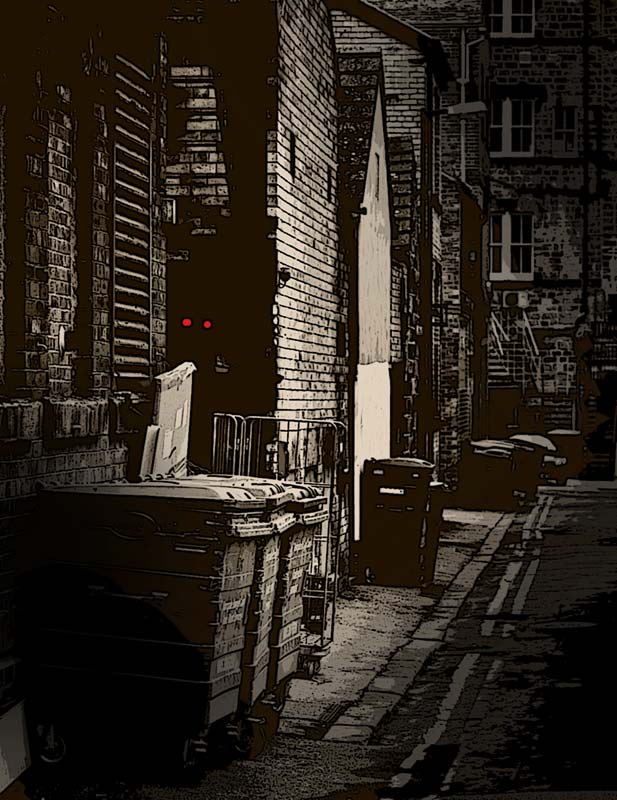
Curley walked up the alley, carefully avoiding the mounds of trash that blocked the way. The paving was uneven, fractured and pocked by pools of water that filled small depressions. The alley was strewn with broken glass. Black-streaked buildings rose on either side blocking what little light was able to filter through the brownish dreary haze. The windows of the buildings were broken at street level but barred to prevent entry. Rusted iron fire escapes and heavy cables adorned the buildings' sides. The alley was quiet and peaceful as the dirty grays of day faded to black with the sunset.
As Curley looked up, to orient himself to the time, he pulled his tattered quilted jacket, black streaked, dingy, like the buildings surrounding him, close to his body to fend off the sharp icy blades of the evening breeze. His eyes sank deeply into their sockets, tired, poor, and despondent. His face was deeply lined, hardened by the weather. His shoulders were rounded by the burden of his low station in life. Night was approaching. Time to find shelter or at least a warm grate on which to spend the night, he thought. He had little money; and, with what little money he had, he would buy a bottle of cheap wine in which he found his only avenue of escape to places his feet would never take him. He foraged slowly and deliberately as he walked, avoiding wet spots, lest his holey shoes allow the moisture to soak his feet. He foraged for edibles. What he often ate was hardly food by normal standards, and hardly edible, even by his. He looked for things of value and things of use, cigarette and cigar butts, from which he would extract whatever remaining tobacco he could, to save until he had enough to roll into a smoke.
Curly accepted his lot in life, even though it had not always been this way. He had had a family, a job, a conventional life, but he abandoned it all. It was never clear whether failure begat his lack of motivation or lack of motivation begat failure. Yet, he, nevertheless, abandoned everything. His depression was ugly. Nothing felt good, not the touch of his loving wife, not even his children's voices. Food had no taste; sleep gave him no rest. He became defeatist, self-destructive, unable to fight, so he ran from his responsibilities. When told to get help or leave, he left, his job, then his home. He slid ever lower down the social hierarchy slide. Now, at the bottom, isolated, alone, he had only himself to care for, or not care for, if he chose. He no longer thought about his previous life, that was someone else. But years of numbing the pain with alcohol had blunted the anger and erased many of the memories. He existed, survived. He was, that was all, and it had become enough. He had sunken as low as one could sink. Things couldn't get worse. He had contemplated death, an alternative to his existence; "But haven't I already died?" he often thought.
Halfway down the alley, Curly spotted a cardboard box, shelter, perhaps, for the night. He picked up the lid and looked into it and let out a cry of horror. A pair of hateful glowing eyes stared back him. These eyes were set in a wrinkled ugly face adorned by a hideous smile, mocking, angry, and spiteful. Curly recoiled, turned as he fell backward in a frenzied attempt to scramble away, but he was not quick enough. As he turned to run, the little man within the box leaped onto Curley's back and attached himself firmly with claw-like hands and feet that were the extensions of his disproportionately long bony arms and legs. Curley threw himself to the ground rolling over and over in the vain hope of extricating himself from the little man. But the little man clung tenaciously, unwilling to let go.
"Feed me!" The little man cried shrilly into Curley's ear. "Feed me! Feed me! Feed me! Feed me!"
Curley danced, turned, jumped and rolled. He threw himself against the walls on either side of the alley, but to no avail.
"Feed me! Feed me!"
"If I feed you, will you leave me?" Curley desperately bargained.
"Feed me, now!" The little man demanded in his piercing shrill voice.
Curley looked around frantically, found a hard mud-stained crust of bread and decomposing lettuce leaves, picked this garbage up, and fed the little man.
"Feed me, more! Feed me!" Little man continued to shout.
Curley ran from the alley. Perhaps more substantial food would assuage the parasite on his back. Horrified and desperate now, he sought real food. He found a cart, and with what little money he had, he purchased food. No sooner bought, than the monster on his back consumed the food; and, as soon as the food was consumed the little man began to cry again.
"Feed me! Feed me! Feed me!"
The shrillness of the angry ranting tore at Curley's ears and drove him mad. At first he tried to feed the little man food, more garbage, even trash, and eventually the clothes on his back, everything he owned, and, finally, what was left of his dignity.
"Feed meeee!"
As the little man ate, his weight increased; and, as the little man's weight increased Curley's shoulders became more stooped, his demeanor more haggard, and his station more hopeless.
"Feed me! Feed me! Feed me!"
The little man was never sated. And, as he ate and ate, his weight continued to increase, until Curley collapsed, broken, tired, and unable to feed the little man any more.
Originally appeared in Being, (A celebration of Spirit, Body, and Mind), M. Talarico and Daughter Publications, 1992

01/31/2018
10:58:34 AM